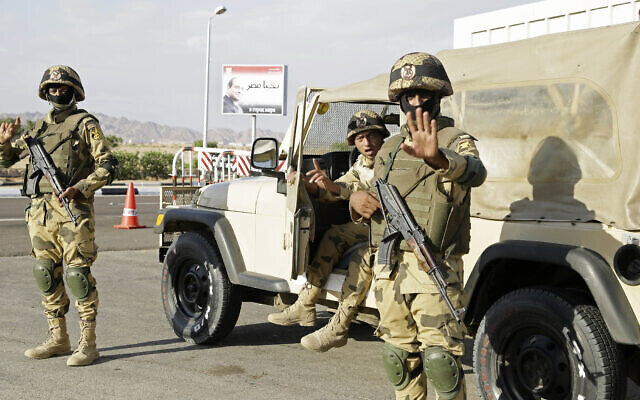Abuse of Human Rights by Egypt and the Neglect of Western Countries
Egyptian soldiers outside of Sharm Al-Sheikh International Airport. Source: Times of Israel
According to a recent report produced by the Human Rights Watch, the Egyptian government — under President Abdel Fatah al-Sisi — has assassinated 778 people between 2015 and last year. President Fatah al-Sisi and his administration claim the deaths were not extrajudicial killings, confidently stating that the victims were killed during shootouts with armed terrorists.
For its report, the Human Rights Watch analyzed nine incidents that were publicly reported as shootouts with armed militants. After interviewing family members of the victims, as well as examining photos and videos released by the authorities, the rights group came to the conclusion that “at the moment of their deaths [they] apparently posed no life-threatening danger to security forces or others, and so amounted to deliberate and unlawful killings.” The Egyptian government and President Fatah al-Sisi have not responded to the allegations.
President Fatah al-Sisi rose to power in 2013 through a military coup. Since his rise to power, President Al-Sisi has targeted all forms of political opposition, from journalists to citizens, charging anyone who is critical of current Egyptian policy and regulations. According to the Human Rights Watch, “Under the pretext of combating terrorism, President Abdel Fatah al-Sisi’s government has effectively given the interior ministry’s police and national security agency free rein to suppress all opposition, including peaceful dissent, with near-absolute impunity for grave abuses.”
Recently, the New York Times released an article detailing how several women have come forward describing sexual violations that were committed in police stations, prisons, and hospitals. These women were either arrested for speaking against the Egyptian government or had gone to the police simply to report a crime. According to the article, “women who encounter Egypt’s criminal justice system risk being taken aside and stripped, groped, prodded and violated.”
Even with such documented abuses being ignored, the Egyptian government remains one of the world’s largest weapons importers, buying weapons from countries all across the world including the United Kingdom, France, Germany, and the U.S. Furthermore, Egypt continues to receive $1.3 billion annually in military aid from the US, raising questions as to why such a democratic country would provide stimulus to an administration that suppresses the freedom of thought and speech.
Egypt has always been a country of high national security interest of the U.S. due to its location, people, and diplomatic power. Egypt contains the Suez Canal, which links the Mediterranean and Red Seas and is an important maritime chokepoint — as it greatly expedites transportation between Asia and Europe. With over 100 million people, Egypt houses the largest Arabic-speaking population, whose deep history and culture hold power in the area. Finally, Egypt has played a significant role in easing Arab-Israeli tensions through the signing of the 1979 peace treaty. These characteristics give Egypt much discretionary power in regards to relations with the U.S., and other Western countries. According to the Congressional Research Service, the United States has provided Egypt with over $84 billion in bilateral foreign aid since 1946, with military assistance increasing significantly after the signing of the 1979 peace treaty.
In the past, U.S. administrations have emphasized investment in the Egyptian military as a method to ensure regional stability. However, with the election of Biden and his campaign promise of “no more blank checks” to Egypt, many activist groups hoped for a change in military aid being sent to the country. The public was dismayed in February when the Biden administration approved the sale of $200 million worth of arms to Egypt. Most recently, the Biden administration announced it would withhold $130 million in military aid until “specific human rights-related conditions” are addressed. Although a small step in the right direction, many human-rights groups were disappointed as the majority of the $300 million aid package was still sent to the Egyptian government.
Although the relationship between the U.S. and Egypt is important from a strategic point of view, at what cost does this value bring? Human rights are being trampled on by a U.S. ally and only small actions have been taken to remedy the situation. Only time will tell how President Al-Sisi will react given the Biden administration’s request for human rights violations to be addressed. One can only hope Western countries will hold their allies accountable for protecting and upholding basic, human rights.

